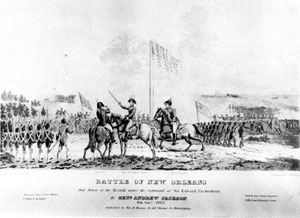
War of 1812
When the United States declared war on Great Britain in June 1812, Tennesseans proudly proclaimed their readiness to preserve the honor and dignity of their country. It seemed unlikely that landlocked Tennessee would be concerned about British violations of maritime rights and impressment of American seamen. The thirst for expansion, specifically for British-owned Canada in the North, and the southern desire for Spanish-held Florida drew Tennesseans into the conflict. The acquisition of Florida would open economic possibilities through the Gulf Coast ports via the river systems of Alabama, at this time part of the Mississippi Territory and claimed by the Creek Indians.
For decades, the Creeks had become increasingly intermingled with white culture through marriage and the adoption of commercial agriculture. Just prior to the War of 1812, however, a more traditional faction known as the “Red Sticks” began promoting an antiwhite campaign inspired by a visit from the great Shawnee chief, Tecumseh. Indian aggression along the frontier, encouraged by Britain and Spain, alarmed American settlers; then an attack on whites and friendly Indians at Fort Mims (near Mobile, Alabama) on August 30, 1813, stirred the outraged populace into action. The Creek War thereby became intertwined with the War of 1812.
In September 1813 Tennessee Governor Willie Blount issued a call for 3,500 volunteers. Tennesseans’ enthusiastic response initiated a tradition that gave the state its nickname of the “Volunteer State.” Andrew Jackson, as major general of the Tennessee militia, along with his military colleague, John Coffee, led a force into the heart of the Creek Nation with the intent of completely destroying the Creeks as a fighting force. Beginning in November 1813, a series of encounters with the Red Sticks culminated in the battle of Horseshoe Bend on March 27, 1814. This battle left over 800 Creeks dead and ended the threat of a Creek invasion.
Throughout the Creek War, the Indians were out-manned, inadequately armed, and lacking in military discipline. In fact, Jackson’s greatest threat came not from the Creeks, but from supply shortages and desertions by troops dissatisfied with their enlistment terms. Nevertheless, the victories won during the Creek War were acclaimed enthusiastically by a nation experiencing military setbacks in the North. As a reward for his efforts, Jackson was commissioned a major general in the United States Regular Army. His treaty with the defeated Creeks at Fort Jackson in August 1814 forced that tribe to forfeit nearly two-thirds of its land (about 23 million acres), which soon filled with white settlers.
Jackson next pressed on into West Florida, securing Pensacola by the end of 1814. Reports of British activities near New Orleans led Jackson’s army to its final destination. This hodgepodge army, composed of backwoods militia from Tennessee and Kentucky, U.S. Army regulars, Choctaw Indians, free blacks, Creoles, and pirates, faced Britain’s elite troops. Jackson’s defensive strategy and the British commanders’ underestimation of American fighting ability led to an English defeat at the battle of New Orleans on January 8, 1815. Tennessee troops under General William Carroll and the ever-present Coffee also played an active role in this American victory. Although much has been made of the fact that this battle occurred after the peace treaty was signed (December 24, 1814), it should be noted that the treaty was not ratified until February 1815. This victory catapulted Andrew Jackson to hero status throughout the country and started a political ascent that led Jackson to the presidency.
In addition to Jackson, several prominent Tennesseans played a vital role in the War of 1812. Congressman Felix Grundy was one of the principal “War Hawks,” mostly congressmen from the South and West who pressed the government for a declaration of war. James Winchester, a resident of Sumner County, was commissioned a brigadier general and led an unsuccessful invasion of Canada. Edmund Pendleton Gaines, an East Tennessean, rose to the rank of major general for his role in defeating the British at Fort Erie in 1814. Sam Houston and Davy Crockett, future legendary heroes, played minor roles in the war against the Creeks.
For Tennessee, the War of 1812 all but eliminated British and Spanish interference in the Southwest. It also broke the power of the southern tribes and led to their eventual removal, opening vast tracts of land for white settlers to exploit. Because of its political and military prominence during the war, Tennessee, for the first time, was cast into the national spotlight.
Suggested Reading
Frank Owsley Jr., Struggle for the Gulf Borderlands (1981)



